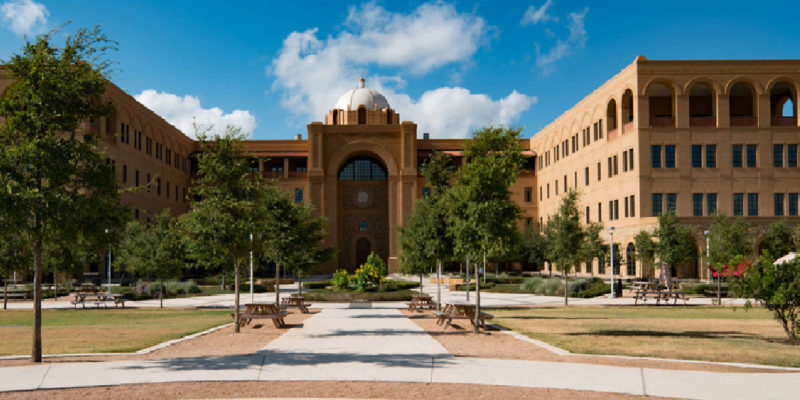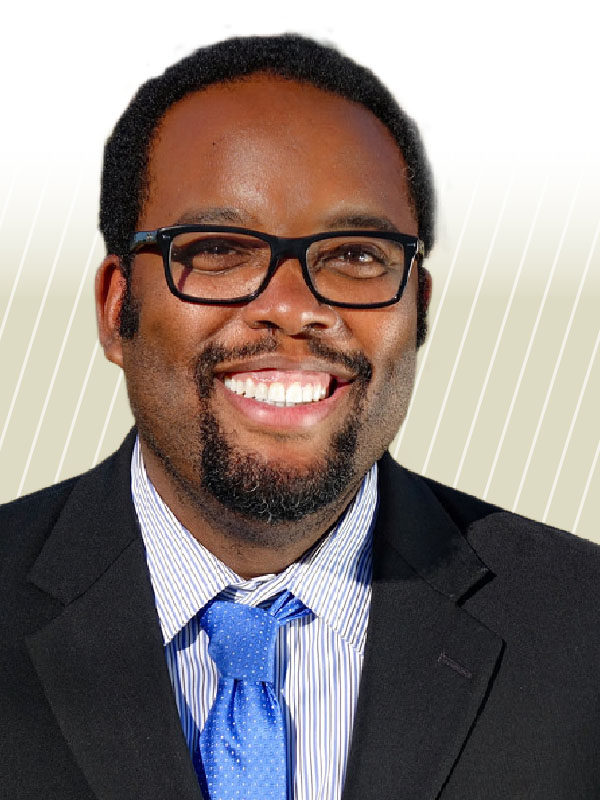When Lloyd A. Butler was about four or five years old, he was fond of saying, “I want to be the best train engineer that Union Pacific has ever had.” His great grandmother, whose husband worked for the railroad, would always respond, “You need an inside job, not an outside job.” That refrain continued throughout his childhood, with little variation.
“When I graduated from high school and was thinking about options, I really was going to go put in an application at Union Pacific, but I thought about my great grandmother and applied for college instead,” Butler now recalls. “What she was trying to say, in so many words, is ‘You have a brain. Use it.’”
So he did. Raised by a single parent with the help of his maternal grandparents, he cobbled together grants and loans to attend college. “Some have been surprised I’ve come this far—to get a good, solid education and then to start as a staff accountant and continue on this career trajectory,” Butler admits. “That’s a point of pride for me.”
Butler, now the executive director of budget and payroll services, Texas A&M University–San Antonio, started his career at the Texas A&M University–Kingsville campus. While conducting a training session on the use of the accounting and general ledger systems, he met the new CFO in San Antonio. “He was impressed with my communication skills and how I presented the data, and he thought that I would be the right person to develop the payroll services department, which was just starting at the San Antonio campus. I interviewed, and was selected for the position.”
Single, he jokes that Texas A&M is his only spouse, particularly now that the institution is moving to Workday.
What challenges have you faced as a result of the impending changeover to Workday?
Just managing the needs of the president’s cabinet and our CFO, while giving the conversion the attention required, has been a challenge. Balancing those two acts, while providing departments with reporting on their operating budgets in a timely manner and coming up with high-level forecasting for our university operating budget and revenue stream for the next four years, calls for long hours and weekends.
I enjoy what I do, so I don’t mind the extra hours in order to see it all come to fruition.
You mentioned forecasting future trends? On what do you base your predictions?
I work with enrollment management and the office of institutional research to get projections on student headcount and semester credit hours. Then we extrapolate that data and project it out over four years. This is our first basis year of having a four-year school population. We started accepting freshmen and sophomores in FY17.
Historically, Texas A&M University–San Antonio was an upper-level institution. The Texas legislature appropriated comprehensive expansion money of approximately $5.5 million per year—or $11 million for the 2016–17 biennium—to facilitate the acceptance of freshman and sophomore students. Because Texas is very dependent on oil and gas revenues, the money was reduced from $11 million to $6.6 million for the 2018–19 biennium—a 39 percent reduction. Fortunately, this reduction was partially offset by the growth in state formula funding, plus the additional appropriation for debt service on a tuition revenue bond, bringing the total reduction in state funding to only 10 percent.
State funding is approximately 41 percent of the university’s total revenue stream. In addition to the comprehensive expansion funds, the majority of the funds the legislature allocates to us is based on a formula developed by the legislature and the Texas Higher Education Coordinating Board. It’s a complicated formula that is dependent on weighted semester credit hour production, and lags behind by two years. In times of fluctuation in our state appropriation, we rely on enrollment growth that drives tuition fee revenue, which is 51 percent of our total revenue stream. Trying to balance the needs of growth, while relying on uncertain funding levels for state appropriations and forecasting formula funding, is a struggle.

What procedures have you recommended to facilitate more efficient operations in payroll services?
On a monthly basis, we look at the percentage of employees who enroll in direct deposit, which saves us from printing and distributing a manual paycheck, and the security issues that go along with that.
Right now, about 93 percent of faculty and staff are enrolled in direct deposit. We send e-mails every month to the individuals who are not enrolled, encouraging them to sign up.
You supervise three employees. As you’ve risen through the ranks, has your management style changed?
Yes, I delegate more. I’ve been able to hire quality employees who I can trust, and to whom I can give significant budget and payroll projects. In June, I hired a budget analyst with a wealth of knowledge who has really stepped up to the task, allowing me to look at the big picture.
I’ve also developed my leadership skills. I realize that people are relying on me. I’ve become more assertive, but in a nice way. Basically, I have a personality where I don’t want to offend or upset people. I want everybody to get along. With my role as executive director, I understand that I have to make decisions that don’t always make people happy, but are in the best interests of the university, department, and/or campus community.
How do you unwind from the pressures of the job?
When I want to take a break, I hike at Enchanted Rock, which is about 90 minutes north of here. I like to be one with nature, as they say. I usually go two or three miles, depending on the weather.
I still have both of my grandparents on my mother’s side, who raised me until I was nine years old. I like to drive back to Kingsville and spend time with my 84-year-old grandfather, who still wants to do what he did when he was 45, even though he no longer is able. I also try to help him out with his rental property.
My grandfather has been an inspiration in my life. He taught me about working hard, meeting your goals, and keeping your word.
If you could travel anywhere in the world, where would you go?
To the Canary Islands, off the coast of Spain. I’ve always thought those islands were very interesting. I spent a few months learning about the culture and people. Interestingly enough, I learned that some of the early founders of San Antonio came from the Canary Islands.
You are an Eagle Scout. What was your service project?
When I was growing up in Kingsville, the fellowship hall in our church needed to be spruced up. I decided to take it upon myself to plan a renovation with the other scouts and make the hall presentable. I secured the materials and scheduled our work so that it didn’t interfere with church activities. It took about three or four days, and the pastor and administrative staff were really pleased with the outcome.
Tell us something about yourself that your co-workers probably don’t know.
I’m afraid of heights. One of my friends works in the oil and gas industry, and he tried to get me to go work with him early in my career. I said, “No way. I might have to climb up to those tall mixers in the refinery. I’m staying where I am … on the first floor.”
MARGO VANOVER PORTER, Locust Grove, Va., covers higher education business issues for Business Officer.



